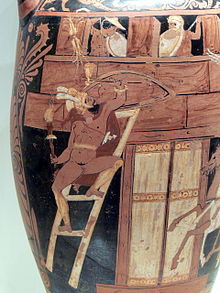*
The Blasphemer
Blake's Illustrations of Dante's Inferno
Plate 27
Inferno: Canto XIV Because the charity of my native place Constrained me, gathered I the scattered leaves, And gave them back to him, who now was hoarse. Then came we to the confine, where disparted The second round is from the third, and where A horrible form of Justice is beheld. Clearly to manifest these novel things, I say that we arrived upon a plain, Which from its bed rejecteth every plant; The dolorous forest is a garland to it All round about, as the sad moat to that; There close upon the edge we stayed our feet. The soil was of an arid and thick sand, Not of another fashion made than that Which by the feet of Cato once was pressed. Vengeance of God, O how much oughtest thou By each one to be dreaded, who doth read That which was manifest unto mine eyes! Of naked souls beheld I many herds, Who all were weeping very miserably, And over them seemed set a law diverse. Supine upon the ground some folk were lying; And some were sitting all drawn up together, And others went about continually. Those who were going round were far the more, And those were less who lay down to their torment, But had their tongues more loosed to lamentation. O'er all the sand-waste, with a gradual fall, Were raining down dilated flakes of fire, As of the snow on Alp without a wind. As Alexander, in those torrid parts Of India, beheld upon his host Flames fall unbroken till they reached the ground. Whence he provided with his phalanxes To trample down the soil, because the vapour Better extinguished was while it was single; Thus was descending the eternal heat, Whereby the sand was set on fire, like tinder Beneath the steel, for doubling of the dole. Without repose forever was the dance Of miserable hands, now there, now here, Shaking away from off them the fresh gleeds. "Master," began I, "thou who overcomest All things except the demons dire, that issued Against us at the entrance of the gate, Who is that mighty one who seems to heed not The fire, and lieth lowering and disdainful, So that the rain seems not to ripen him?" And he himself, who had become aware That I was questioning my Guide about him, Cried: "Such as I was living, am I, dead. If Jove should weary out his smith, from whom He seized in anger the sharp thunderbolt, Wherewith upon the last day I was smitten, And if he wearied out by turns the others In Mongibello at the swarthy forge, Vociferating, 'Help, good Vulcan, help!' Even as he did there at the fight of Phlegra, And shot his bolts at me with all his might, He would not have thereby a joyous vengeance." Then did my Leader speak with such great force, That I had never heard him speak so loud: "O Capaneus, in that is not extinguished Thine arrogance, thou punished art the more; Not any torment, saving thine own rage, Would be unto thy fury pain complete." "
 |
| Capaneus |
From Wikipedia, the free encyclopedia
In Greek mythology, Capaneus (Greek: Καπανεύς) was a son of Hipponous and either Astynome (daughter of Talaus)[1] or Laodice (daughter ofIphis),[2] and husband of Evadne, with whom he fathered Sthenelus.[3] Some call his wife Ianeira.[4]Mythology[edit]
According to the legend, Capaneus had immense strength and body size and was an outstanding warrior. He was also notorious for his arrogance. He stood just at the wall of Thebes at the siege of Thebes and shouted that Zeus himself could not stop him from invading it. In Aeschylus, he bears a shield with a man without armour withstanding fire, a torch in hand, which reads 'I will burn the city,' in token of this. While he was mounting the ladder, Zeus struck and killed Capaneus with a thunderbolt, and Evadne threw herself on her husband's funeral pyre and died.[5][6][7][8][9][10] His story was told by Aeschylus in his Seven against Thebes,[by Euripides, and by the Roman poet Statius.
- In the fourteenth canto of his Inferno, Dante sees Capaneus in the seventh circle (third round) of Hell. Along with the other blasphemers, or those "violent against God", Capaneus is condemned to lie supine on a plain of burning sand while fire rains down on him. He continues to curse the deity (whom, being a pagan, he addresses as "Jove" a.k.a. Jupiter) despite the ever harsher pains he thus inflicts upon himself, so that God "thereby should not have glad vengeance."

No comments:
Post a Comment